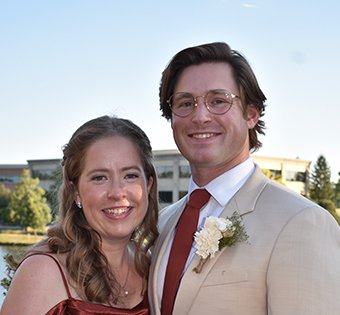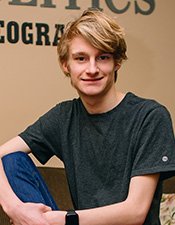
Wes Davenport, BS ’20, BSBA ’20, was interviewed by Gabe Mott, an honors student studying political science and statistics.
Wes Davenport is lucky; his professional day-to-day responsibilities are filled with discussion of his favorite subject: “I just love talking about economics.”
As an assistant professor of economics and statistics at Kankakee Community College in Kankakee, Ill., and previously serving as an adjunct instructor, Wes is responsible for teaching crucial quantitative skills to future professionals.
Although some economic issues seem inherently political, such as tariffs or the minimum wage, Wes helps his students develop a neutral analytical approach.
“Whatever we talk about in class is not politics … I’m teaching students how to approach problems as an economist,” he explained.
Aside from his day-to-day teaching and advising responsibilities, Wes is looking to start an economics club and a podcast.
With degrees in economics, sport management, and business management with a concentration in business intelligence, Wes also pursues his own extensive research agenda, with an interest in the intersection of law and economics. He has conducted regression analysis of the suburbs in Chicago and investigated the impacts of a particular law in Arizona concerning restrictions on homeownership.
Still, the most rewarding part of Wes’s job is the students: “The research side of things is fun as well, but the most fun that I have is just talking with students,” he said.
In his free time, Wes is an avid sports fan. In fact, when asked why he chose to pursue his career, he cited his love of sports: “I played basketball (at ONU)...I loved basketball, love sports,” he said.
At ONU, Wes earned two degrees: a Bachelor of Science and a Bachelor of Science in Business Administration. He credits the flexibility of the programs and his professors with enabling him to pursue all his academic interests.
In particular, Wes thanks Dr. Brian Hofman, associate professor of sport management, for guiding him through his academic career. Dr. Hofman “mapped out a path,” he said, “where I would be able to do both things at once.”
“Without him (Hofman), I wouldn’t have been able to get the two degrees,” Wes explained. Dr. Hofman also pointed him toward teaching as a career option.
Wes was also deeply impacted by Dr. David McClough, professor of economics, who he recalls was very characteristically friendly. One day, after a virtual class session (Wes attended ONU during the COVID-19 pandemic), Dr. McClough asked him to stay after and gave him some interesting book recommendations on economics.
“That’s what kind of sparked…this new career path,” he said.
The Honors Program at ONU was also deeply influential to Wes, providing “structural support” in his academics and a source of “really interesting intellectual conversations.”
“I’m obviously very thankful and owe a lot to the Honors Program,” he said.
Wes’s advice to current ONU students is to reach out to professors. “Make connections with your professors, that’s really the advantage (of smaller schools) ...You have unprecedented access to your professors,” he said.
